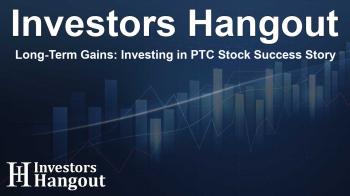Long-Term Gains: Investing in PTC Stock Success Story

Exploring PTC Stock's Historical Performance
PTC Inc (NASDAQ: PTC) has made a significant mark in the stock market over the past decade. With an impressive annualized return of 19.76%, investors have seen substantial growth compared to the general market. Today, the market capitalization of PTC stands at an impressive $24.56 billion, highlighting its strong position in the industry.
The Impact of Compound Returns on Your Investment
Consider this: if someone invested $1000 in PTC stock a decade ago, their investment would now be worth an astonishing $6,006.18, assuming the price of PTC shares is approximately $204.15 at this moment. This remarkable increase underscores the power of compounded returns and emphasizes how long-term investments can lead to astronomical gains.
The Positive Performance Trend
Over the last ten years, PTC stock has consistently showed growth, with an annual return surpassing 6.72% relative to the market. Such performance suggests the stock is a promising asset for long-term investors looking for wealth accumulation and stability.
Understanding the Boost in Market Value
PTC's market value isn't just a number; it reflects the company's innovation, dedication, and strategic direction. This growth is not only due to favorable market conditions but also the company's adeptness at leveraging technology and software solutions to enhance its service offerings. As industries evolve, PTC continues to adapt, cementing its reputation as a leader in the competitive landscape.
Looking Ahead: The Future of PTC Investments
The consistent upward trend of PTC stock hints at a promising future. Investors are optimistic about the company’s capacity to innovate and expand its market presence. With new advancements in technology, especially amid the digital transformation many sectors are experiencing, PTC is well-positioned to capture growth opportunities.
Key Factors Influencing PTC's Stock
Several factors are crucial to understanding the dynamics of PTC's stock performance. Market trends, company earnings reports, and industry shifts all play vital roles. Keeping an eye on these elements can provide potential investors with insights into how PTC will fare in the coming years, making it essential to stay informed.
Frequently Asked Questions
1. What is the average annual return of PTC?
The average annual return for PTC has been 19.76% over the past decade, showcasing its strong market performance.
2. How much would a $1000 investment in PTC be worth now?
A $1000 investment in PTC stock ten years ago would be worth approximately $6,006.18 today.
3. What is PTC's market capitalization currently?
PTC currently has a market capitalization of about $24.56 billion.
4. What factors influence PTC's stock performance?
Factors such as market trends, earnings reports, and industry changes significantly impact PTC's stock performance.
5. What is the significance of compounded returns?
Compounded returns illustrate how investments grow over time, reinforcing the value of patience and long-term strategy in investing.
About The Author
Contact Owen Jenkins privately here. Or send an email with ATTN: Owen Jenkins as the subject to contact@investorshangout.com.
About Investors Hangout
Investors Hangout is a leading online stock forum for financial discussion and learning, offering a wide range of free tools and resources. It draws in traders of all levels, who exchange market knowledge, investigate trading tactics, and keep an eye on industry developments in real time. Featuring financial articles, stock message boards, quotes, charts, company profiles, and live news updates. Through cooperative learning and a wealth of informational resources, it helps users from novices creating their first portfolios to experts honing their techniques. Join Investors Hangout today: https://investorshangout.com/
The content of this article is based on factual, publicly available information and does not represent legal, financial, or investment advice. Investors Hangout does not offer financial advice, and the author is not a licensed financial advisor. Consult a qualified advisor before making any financial or investment decisions based on this article. This article should not be considered advice to purchase, sell, or hold any securities or other investments. If any of the material provided here is inaccurate, please contact us for corrections.

